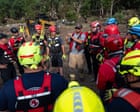
In the face of natural disasters and global events, the spirit of collaboration and innovation shines brightly around the world, underscoring the common threads that connect humanity. Recent initiatives and developments across various regions exemplify this harmonious spirit, offering glimpses into both local and international cooperation.
In Texas, a remarkable show of cross-border solidarity unfolded as firefighters and first responders from Mexico offered their expertise and aid in search and rescue operations following severe flooding of the Guadalupe River. Enveloping entire communities in despair due to the sudden deluge, the devastation called for immediate action, transcending national borders. Ismael Aldaba, founder of Fundacíon 911 in Acuña, Mexico, emphasized the shared mission of firefighters worldwide. “When it comes to firefighters, there’s no borders,” Aldaba noted, highlighting the universal commitment to assist those in need, regardless of geographic origin.
This collective effort underscores the power of collaboration in addressing urgent crises, reminding us that neighbors can come together in challenging times, driven by shared values and goals. The willingness of these Mexican first responders to cross into Texas demonstrates a heartening unity and the strength of humanitarian ties.
Elsewhere in the world, promising technological advancements are being leveraged for the benefit of public health. New approaches are being tested to combat mosquito-borne diseases such as chikungunya, dengue, and the Zika virus. Traditional strategies have shown limitations, prompting innovative methods to be trialed with encouraging results. As these new techniques unfold, they hold the potential to significantly impact regions both within metropolitan areas and across overseas territories, contributing to global health improvements.
Meanwhile, in Australia, discussions are underway about a potential defense pact with Ukraine. Government documents suggest that cooperation on intelligence and drone manufacturing could become central components of this pact, signaling a step forward in international defense collaboration. Such partnerships are indicative of a growing preference for collaborative rather than isolated approaches in addressing complex, global challenges.
Australia’s domestic concerns, however, reflect a mix of optimism and caution. The recent decision by the Reserve Bank of Australia to leave interest rates unchanged has met with mixed reactions from various sectors. Retailers and mortgage holders express disappointment, wary of future inflationary pressures. Yet, the decision highlights a strategized attempt to balance economic stability with fiscal caution, aiming to prevent any resurgence of inflationary woes.
On a socio-economic front, Portugal’s city of Tomar is witnessing transformative urban development through a significant investment initiative. A funding injection of 60 million euros aims to create 345 new housing units as part of a public acquisition offer launched in late 2023. This investment promises to address housing needs, supporting local communities and yielding long-term benefits for the city’s infrastructure and residents.
Uniting these different narratives is a common theme of collaboration and adaptability in the face of both natural adversities and socio-economic challenges. Whether through cross-border humanitarian aid or domestic policy adaptations, these stories illustrate a broader global resilience. These efforts underscore the potential of collective action to drive solutions, building bridges across divides and fostering a shared sense of purpose in creating a more harmonized world.
Source: {link}
